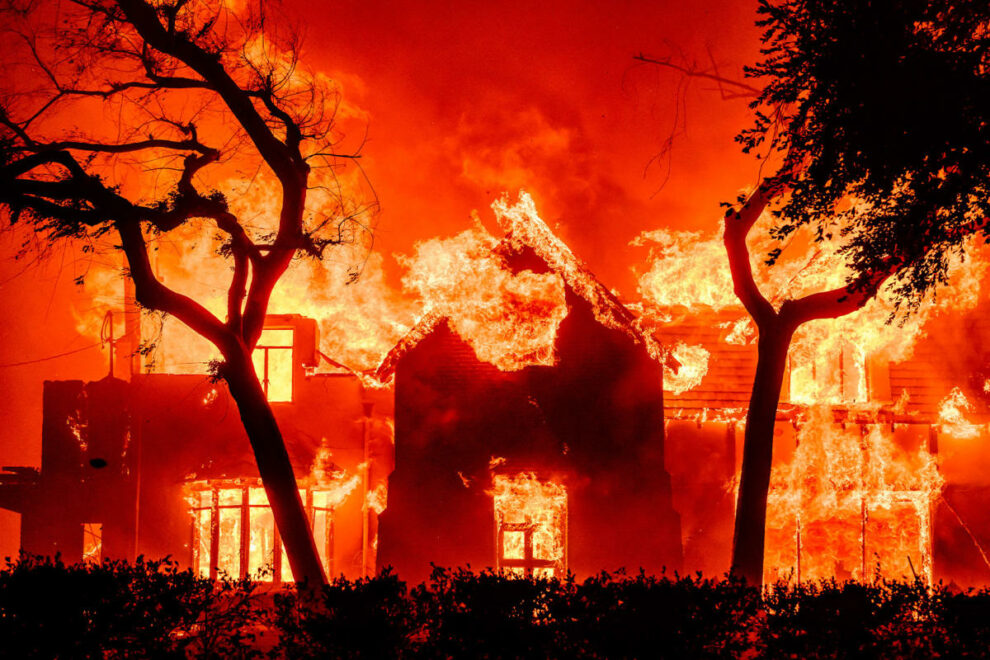California firefighters are trying to contain fast-moving, deadly wildfires that began in the Pacific Palisades this past week before the dry winds that escalated the fires return.
The Palisades and Eaton fires, along with other smaller blazes, have spread in just days across nearly 39,000 acres. Flames have been fanned by a fierce windstorm known as the Santa Ana winds, which could return early next week, meteorologists warn.
Parts of Southern California are under red flag warnings from the National Weather Service beginning Saturday evening and continuing through Sunday evening as strong winds, low humidity and no possible rain return to risk re-igniting or feeding fires.
The areas stretching from Anaheim to Temecula to Big Bear City and Wrightwood are under red flag warning. Officials reminded people to stay vigilant and be prepared with a fire plan.
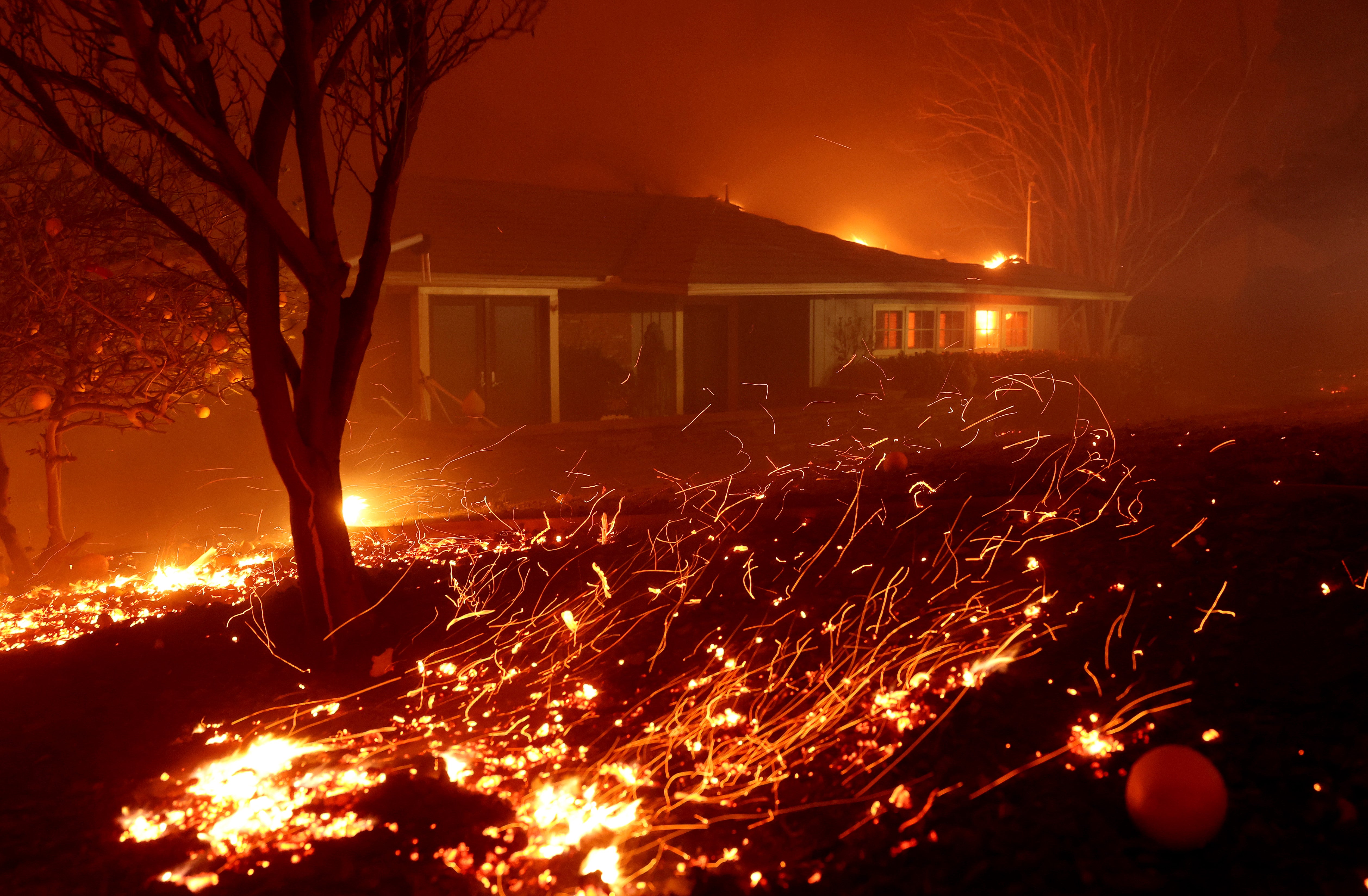
At least 11 people are dead, officials said, as the fast-moving blazes force 166,000 residents to evacuate their properties across California. Hundreds of thousands of homes and businesses have been left in blackout conditions with schools in impacted areas closing their doors.
As of Saturday, January 11, the Palisades Fire is 11 percent contained, while the Eaton Fire is 15 percent contained.
New evacuation orders arose for the neighborhood of Brentwood and parts of the San Fernando Valley on January 10.
California Governor Gavin Newsom announced that more than 7,500 local, state and federal firefighting personnel and 1,200 fire trucks have been deployed in a bid to grasp a handle on the fast-moving fires.
President Joe Biden has told California officials to “spare no expense,” noting the federal government will cover “100 percent of the cost” for the next 180 days.
Where are the fires currently burning?
The first and most major fire is burning in the Pacific Palisades, an affluent coastal neighborhood west of Los Angeles. It began around 10.30 a.m. on January 7 and has burned more than 22,661 acres.
Around 6:30 p.m. on January 7, the Eaton Fire erupted in the Altadena area, north of Pasadena, and has engulfed more than 14,000 acres.
The Hurst fire in the San Fernando Valley has burned about 771 acres and is around 80 percent contained as of January 11.
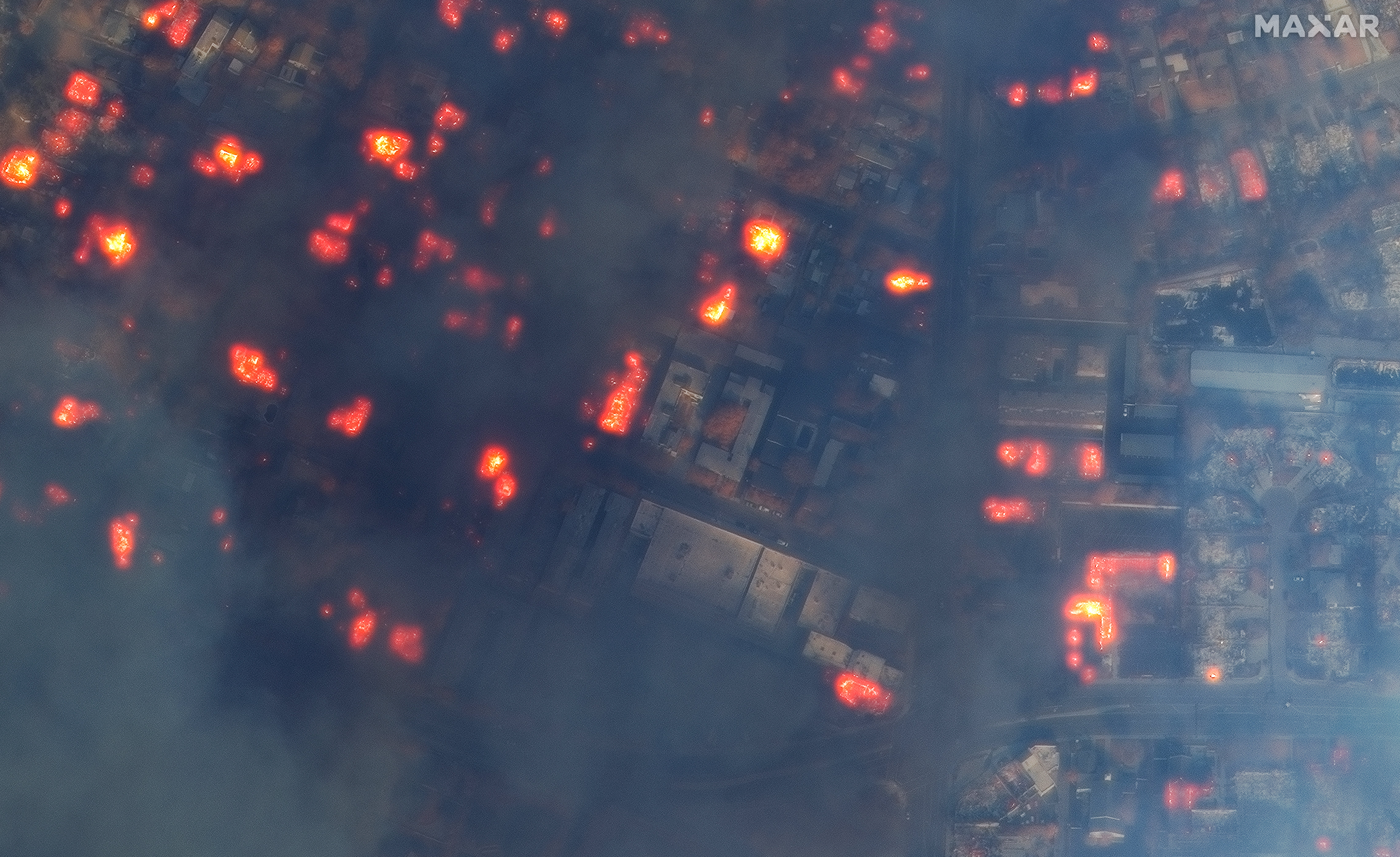
Another conflagration, the Kenneth Fire, ignited in the afternoon on January 9 and has now burned 1,052 acres near the Los Angeles-Ventura County line. It was at 50 percent containment as of Saturday morning.
“Fanned by strong Santa Ana winds, the fire threatens nearby communities and infrastructure, prompting swift evacuation orders,” the agency wrote on its website. “Firefighters from Los Angeles and Ventura counties are actively engaged in containment efforts, deploying both ground crews and aerial resources.”
The Hurst fire ignited near San Fernando on January 7, burning nearly 800 acres. It was 76 percent contained as of Saturday. Another fire nearby, called the Archer Fire, began on January 10.
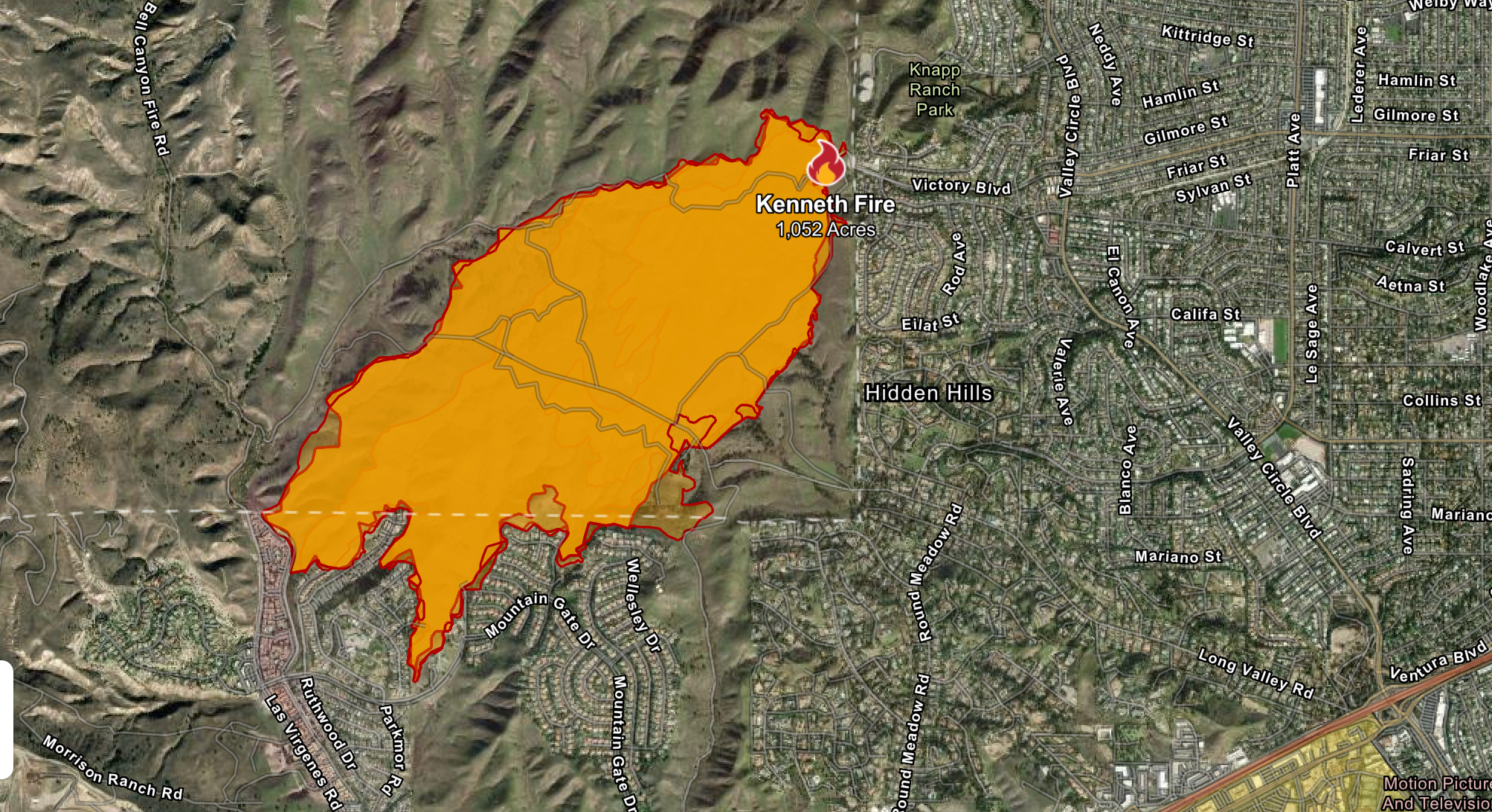
Which areas are being evacuated?
Some 200,000 residents are reported to have been evacuated across southern California.
Many of the evacuations were in the Pacific Palisades area, but others were in parts of Santa Monica and Altadena, with a mandatory evacuation order in place for the region between Piedra Morada Drive and Pacific Coast Highway due to dangerous conditions.
Several Hollywood stars – including Ben Affleck, Tom Hanks, Rita Wilson and Mark Hamill, have been forced to flee.
Live: evacuation order areas in Los Angeles County
The Eaton Fire alone prompted tens of thousands of evacuation orders, Angeles National Forest officials added. City spokeswoman Lisa Derderian said at least 550 houses were within the evacuation zones of the Eaton Canyon fire.
“We were having dinner with the family and we just had to leave because the fire was coming so fast,” Darinka Whitmore from Eaton Canyon in Altadena, who fled with her husband and their four children, told The New York Times. “We just grabbed our backpacks and our kids and our doggies.”
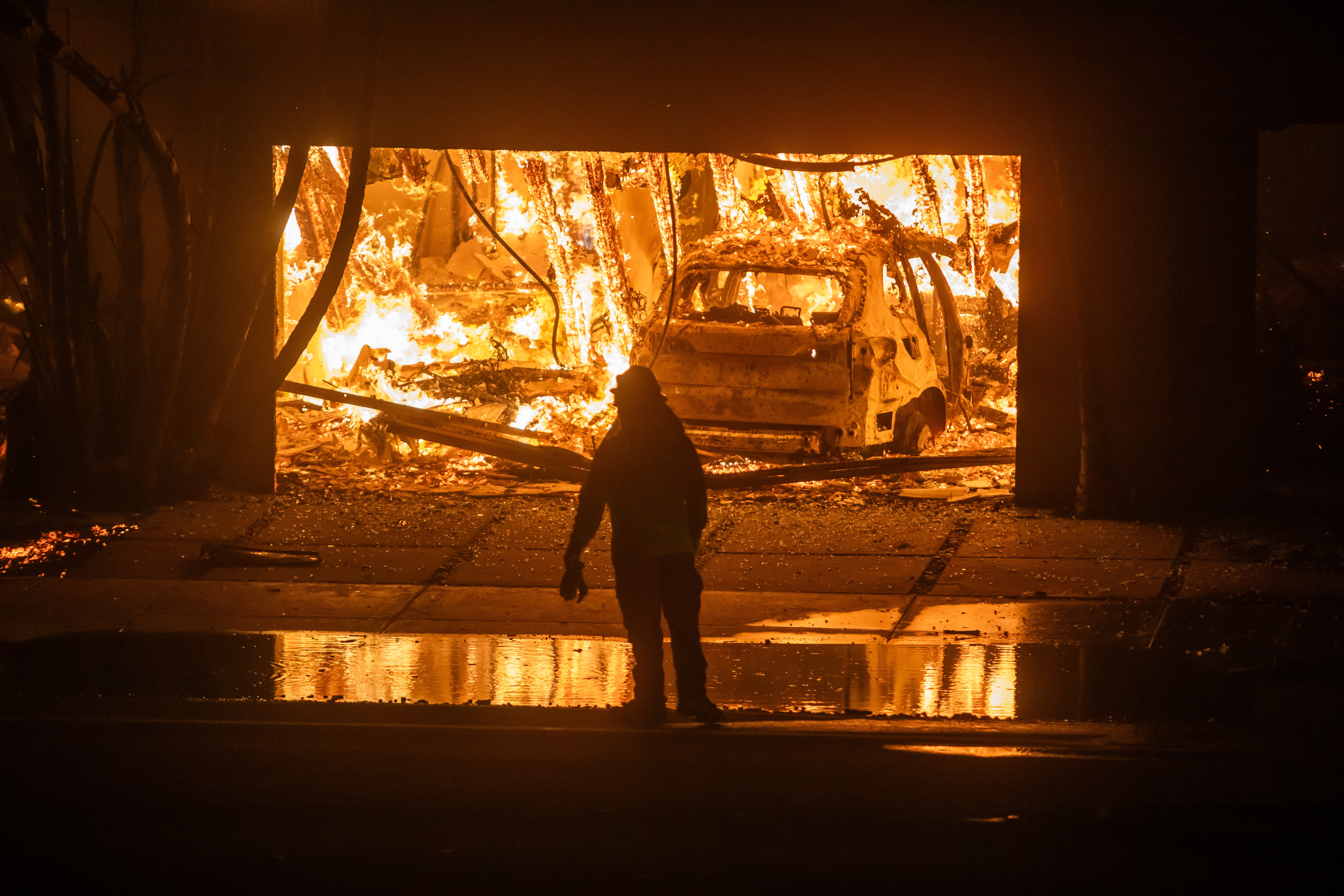
Have there been any casualties?
The death toll stood at 11 as of January 11. There are also numerous injuries, but the exact count is unknown.
The identified victims include 83-year-old grandfather Rodney Nickerson; 66-year-old Victor Shaw; 67-year-old father Anthony Mitchell and his early-20s son, Justin Mitchell; and grandmother Erliene Kelly.
What is causing the fires?
The fast-moving wildfires are being fueled by a weather phenomenon known as the Santa Ana winds.
The Santa Anas are dry, warm and gusty northeast winds that blow from Nevada and Utah to Southern California toward the coast. They move in the opposite direction of the normal onshore flow that carries moist air from the Pacific into the region.
The name is understood to be linked to Santa Ana Canyon in Orange County, but the weather has other nicknames such as “devil winds” or “red wind.”
Gusts calmed on January 9 but the Santa Ana winds are expected to pick back up early next week, The Weather Channel reported. A red flag warning, which indicates dangerous fire conditions, is in place through the weekend.
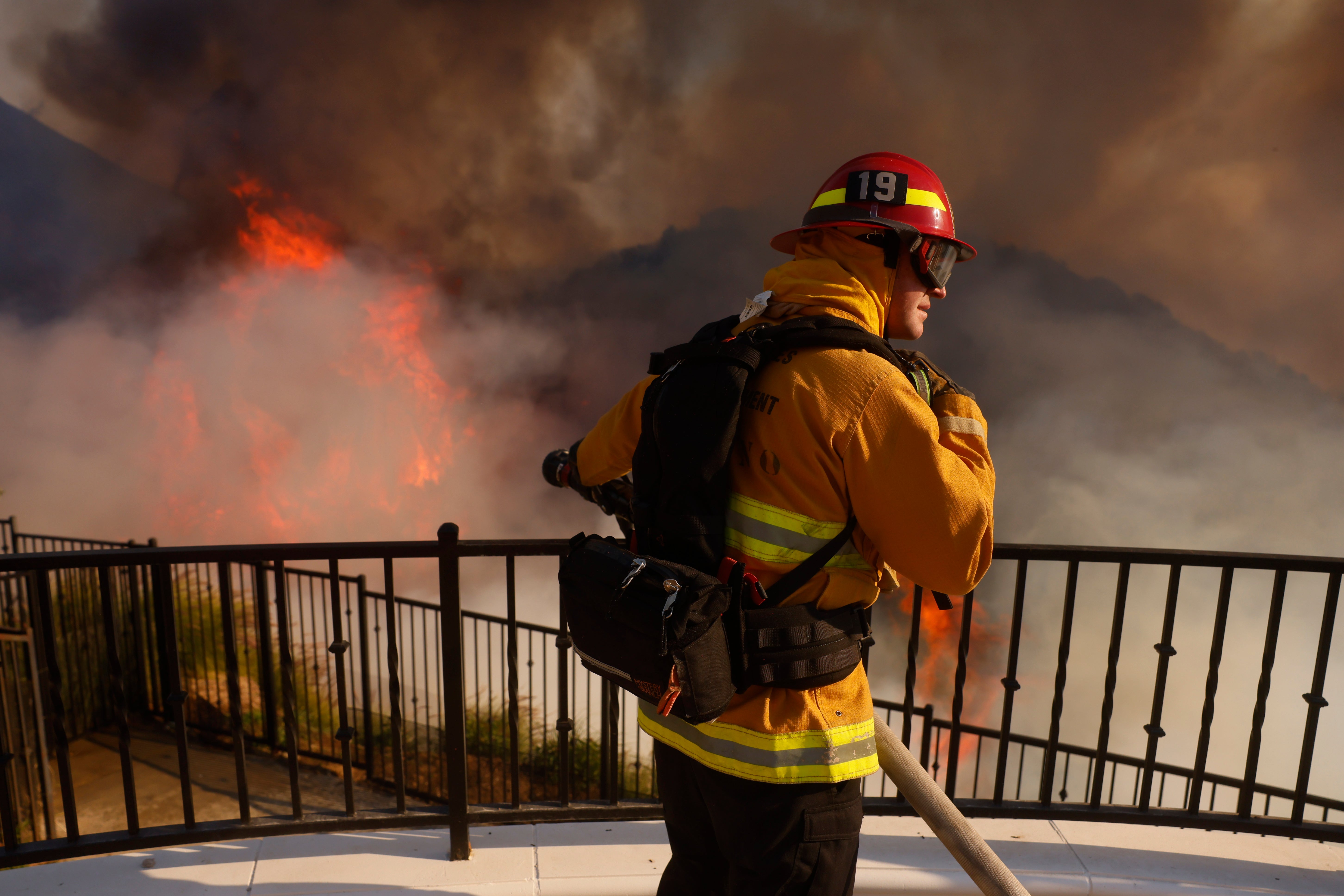
What have officials said?
“By no stretch of the imagination are we out of the woods,” California Governor Gavin Newsom said on Tuesday afternoon. “I saw firsthand the impact of these swirling winds and the embers and the number of structures that are destroyed. Not a few, many structures already destroyed.”
Newsom dispelled claims of waning water supplies after President-elect Donald Trump perpetuated the rumors and accused firefighters of not using ocean water to “protect a tiny little fish.”
“Broadly speaking, there is no water shortage in Southern California right now, despite Trump’s claims that he would open some imaginary spigot,” the governor said.
Los Angeles Mayor Karen Bass declared a state of emergency because of the Palisades fire. “The city is working aggressively to confront this emergency,” she said.
On Thursday, Bass called on residents to “conserve water to the extent that you can” as firefighters battle the historic blaze. She said: “But make no mistake, Los Angeles will rebuild stronger than ever.”
California firefighters are trying to contain fast-moving, deadly wildfires that began in the Pacific Palisades this past week before the dry winds that escalated the fires return.
The Palisades and Eaton fires, along with other smaller blazes, have spread in just days across nearly 39,000 acres. Flames have been fanned by a fierce windstorm known as the Santa Ana winds, which could return early next week, meteorologists warn.
Parts of Southern California are under red flag warnings from the National Weather Service beginning Saturday evening and continuing through Sunday evening as strong winds, low humidity and no possible rain return to risk re-igniting or feeding fires.
The areas stretching from Anaheim to Temecula to Big Bear City and Wrightwood are under red flag warning. Officials reminded people to stay vigilant and be prepared with a fire plan.

At least 11 people are dead, officials said, as the fast-moving blazes force 166,000 residents to evacuate their properties across California. Hundreds of thousands of homes and businesses have been left in blackout conditions with schools in impacted areas closing their doors.
As of Saturday, January 11, the Palisades Fire is 11 percent contained, while the Eaton Fire is 15 percent contained.
New evacuation orders arose for the neighborhood of Brentwood and parts of the San Fernando Valley on January 10.
California Governor Gavin Newsom announced that more than 7,500 local, state and federal firefighting personnel and 1,200 fire trucks have been deployed in a bid to grasp a handle on the fast-moving fires.
President Joe Biden has told California officials to “spare no expense,” noting the federal government will cover “100 percent of the cost” for the next 180 days.
Where are the fires currently burning?
The first and most major fire is burning in the Pacific Palisades, an affluent coastal neighborhood west of Los Angeles. It began around 10.30 a.m. on January 7 and has burned more than 22,661 acres.
Around 6:30 p.m. on January 7, the Eaton Fire erupted in the Altadena area, north of Pasadena, and has engulfed more than 14,000 acres.
The Hurst fire in the San Fernando Valley has burned about 771 acres and is around 80 percent contained as of January 11.

Another conflagration, the Kenneth Fire, ignited in the afternoon on January 9 and has now burned 1,052 acres near the Los Angeles-Ventura County line. It was at 50 percent containment as of Saturday morning.
“Fanned by strong Santa Ana winds, the fire threatens nearby communities and infrastructure, prompting swift evacuation orders,” the agency wrote on its website. “Firefighters from Los Angeles and Ventura counties are actively engaged in containment efforts, deploying both ground crews and aerial resources.”
The Hurst fire ignited near San Fernando on January 7, burning nearly 800 acres. It was 76 percent contained as of Saturday. Another fire nearby, called the Archer Fire, began on January 10.

Which areas are being evacuated?
Some 200,000 residents are reported to have been evacuated across southern California.
Many of the evacuations were in the Pacific Palisades area, but others were in parts of Santa Monica and Altadena, with a mandatory evacuation order in place for the region between Piedra Morada Drive and Pacific Coast Highway due to dangerous conditions.
Several Hollywood stars – including Ben Affleck, Tom Hanks, Rita Wilson and Mark Hamill, have been forced to flee.
Live: evacuation order areas in Los Angeles County
The Eaton Fire alone prompted tens of thousands of evacuation orders, Angeles National Forest officials added. City spokeswoman Lisa Derderian said at least 550 houses were within the evacuation zones of the Eaton Canyon fire.
“We were having dinner with the family and we just had to leave because the fire was coming so fast,” Darinka Whitmore from Eaton Canyon in Altadena, who fled with her husband and their four children, told The New York Times. “We just grabbed our backpacks and our kids and our doggies.”

Have there been any casualties?
The death toll stood at 11 as of January 11. There are also numerous injuries, but the exact count is unknown.
The identified victims include 83-year-old grandfather Rodney Nickerson; 66-year-old Victor Shaw; 67-year-old father Anthony Mitchell and his early-20s son, Justin Mitchell; and grandmother Erliene Kelly.
What is causing the fires?
The fast-moving wildfires are being fueled by a weather phenomenon known as the Santa Ana winds.
The Santa Anas are dry, warm and gusty northeast winds that blow from Nevada and Utah to Southern California toward the coast. They move in the opposite direction of the normal onshore flow that carries moist air from the Pacific into the region.
The name is understood to be linked to Santa Ana Canyon in Orange County, but the weather has other nicknames such as “devil winds” or “red wind.”
Gusts calmed on January 9 but the Santa Ana winds are expected to pick back up early next week, The Weather Channel reported. A red flag warning, which indicates dangerous fire conditions, is in place through the weekend.

What have officials said?
“By no stretch of the imagination are we out of the woods,” California Governor Gavin Newsom said on Tuesday afternoon. “I saw firsthand the impact of these swirling winds and the embers and the number of structures that are destroyed. Not a few, many structures already destroyed.”
Newsom dispelled claims of waning water supplies after President-elect Donald Trump perpetuated the rumors and accused firefighters of not using ocean water to “protect a tiny little fish.”
“Broadly speaking, there is no water shortage in Southern California right now, despite Trump’s claims that he would open some imaginary spigot,” the governor said.
Los Angeles Mayor Karen Bass declared a state of emergency because of the Palisades fire. “The city is working aggressively to confront this emergency,” she said.
On Thursday, Bass called on residents to “conserve water to the extent that you can” as firefighters battle the historic blaze. She said: “But make no mistake, Los Angeles will rebuild stronger than ever.”

